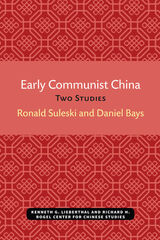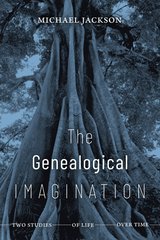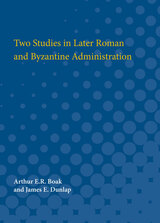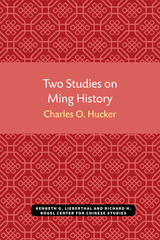4 books about Two Studies

Early Communist China
Two Studies
Ronald Suleski and Daniel Bays
University of Michigan Press, 1969
Contains two detailed case studies. In “The Fu-t’ien Incident, December 1930,” Ronald Suleski describes the pivotal incident in the power struggle between Mao Zedong and the Communist Central Committee. Daniel Bays’s study of “Agrarian Reform in Kwangtung, 1950–1953” focuses upon the measures taken by the Chinese Communist Party to control and eventually collectivize rural elites in Kwangtung province.
[more]

The Genealogical Imagination
Two Studies of Life over Time
Michael Jackson
Duke University Press, 2021
In The Genealogical Imagination Michael Jackson juxtaposes ethnographic and imaginative writing to explore intergenerational trauma and temporality. Drawing on over fifty years of fieldwork, Jackson recounts the 150-year history of a Sierra Leone family through its periods of prosperity and powerlessness, war and peace, jihad and migration. Jackson also offers a fictionalized narrative loosely based on his family history and fieldwork in northeastern Australia that traces how the trauma of wartime in one generation can reverberate into the next. In both stories Jackson reflects on different modes of being-in-time, demonstrating how genealogical time flows in stops and starts—linear at times, discontinuous at others—as current generations reckon with their relationships to their ancestors. Genealogy, Jackson demonstrates, becomes a powerful model for understanding our experience of being-in-the-world, as nobody can escape kinship and the pull of the past. Unconventional and evocative, The Genealogical Imagination offers a nuanced account of how lives are lived, while it pushes the bounds of the forms that scholarship can take.
[more]

Two Studies in Later Roman and Byzantine Administration
By Arthur E.R. Boak and James E. Dunlap
University of Michigan Press, 1924
This study of the Master of the Offices is an attempt to throw more light upon the intricate administrative system obtaining in the Later Roman and Byzantine Empires through a detailed treatment of the history and scope of one particular office. It is a development of work done in connection with a doctoral thesis on the Roman Magistri, some of the results of which are incorporated in the first chapter.
[more]

Two Studies on Ming History
Charles O. Hucker
University of Michigan Press, 1971
In the first study of Two Studies on Ming History, Charles O. Hucker presents an account of a military campaign that provides insight into the nature of civil officials’ authority, decision-making, and relationship with the Ming court. In the spring and summer of 1556, a Chinese renegade named Hsü Hai led an invading group of Japanese and Chinese soldiers on a plundering foray through the northeastern sector of Chekiang province. Opposing them was a military establishment that for years past had been battered by coastal raiders, now under the control of an ambitious and clever official named Hu Tsung-hsien. The campaign was not one of the most consequential in China’s military history, even during the Ming dynasty (1368–1644). But it was famous and well reported in its time, and it illustrates some of the unusual ways in which the Chinese of the imperial age coped with the often unusual military problems they faced.
In the second part of Two Studies, Hucker presents a translation of K’ai-tu ch’uan-hsin, a popular narrative of a spontaneous demonstration in which literati and commoners alike rose up to defend an austere and incorruptible adherent to Confucian morality who had been doomed to die because of his defiance of the ruthless and heterodox clique that had usurped imperial power. In 1626, Chinese political morality was at one of its lowest ebbs. On the throne at Peking was an incompetent twenty-one-year-old emperor who was much too occupied with puttering at carpentry to pay attention to the government. Into the vacuum stepped Wei Chung-hsien, the favorite of the emperor’s governess. Wei used brutal terror to make himself undisputed master of the vast bureaucratic mechanism that administered China. One of Wei’s many victims was Chou Shun-ch’ang, a member of the official class who was said to have hated evil as a personal enemy. Chou became critical of Wei, an order was put out for Chou’s arrest, and a popular uprising occurred in protest.
[more]
READERS
Browse our collection.
PUBLISHERS
See BiblioVault's publisher services.
STUDENT SERVICES
Files for college accessibility offices.
UChicago Accessibility Resources
home | accessibility | search | about | contact us
BiblioVault ® 2001 - 2024
The University of Chicago Press









